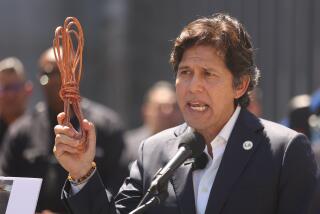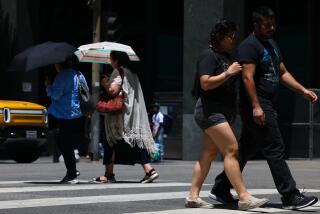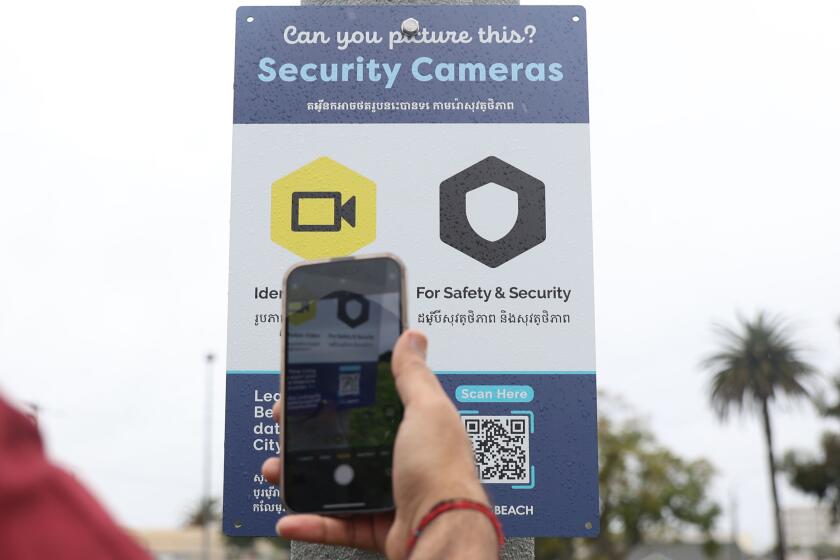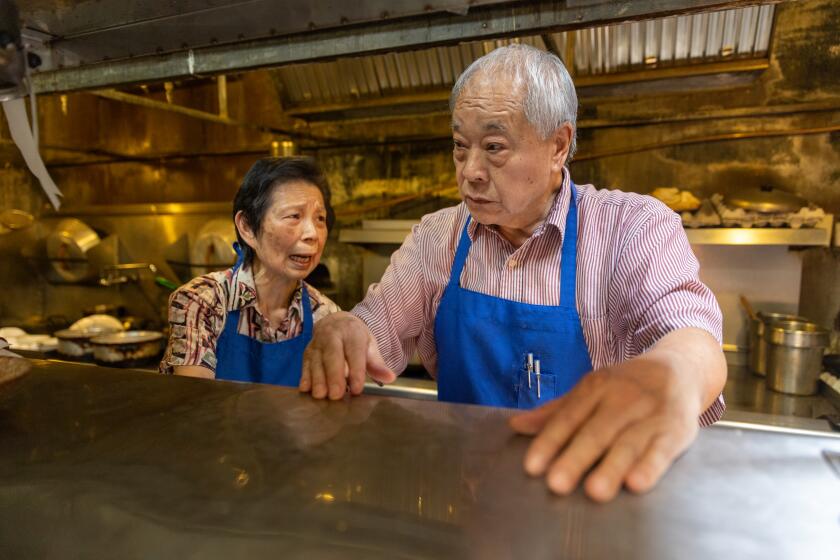Just Before Dying, Killer Refused to Make an Appeal
Seeking redemption for his vicious crimes and self-respect at the end of his tortured life, murderer David Edwin Mason walked into the gas chamber Tuesday morning and gave permission for his own death.
After repeatedly refusing to call off the execution that only he could stop, Mason was already strapped into the gas chamber and just moments from death when San Quentin state prison Warden Daniel Vasquez offered him one last chance.
But the five-time murderer, looking straight ahead in grim determination, spoke his final words: “No warden, I want to proceed with the execution. Thank you, warden.”
Soon, cyanide gas filled the chamber and Mason, 36, gasped for breath, throwing back his head as his neck muscles bulged, his face turned red and his eyes rolled back in his head.
After 14 minutes, Vasquez officially pronounced Mason dead, ending the life of a social misfit, sociopath and serial killer who finally found a measure of dignity in his own death. He was the 196th person to die in the San Quentin gas chamber.
“This act of courage, being strapped in the chair and going out without a whimper, was for Dave the one act that could get him respect,” said his attorney, Mike Brady, who could not hold back his tears as he witnessed the execution. “And he had to give his life to do it.”
Mason was the second killer executed in California since voters reinstated capital punishment in 1978. He was convicted of killing and robbing four elderly people in their Oakland homes in 1980 and strangling a fellow inmate in 1982. He also admitted a Butte County killing in 1980 but was never tried for that murder.
During more than a decade in prison, Mason said he began to feel such remorse for his crimes that he decided to drop his remaining federal court appeals and volunteer for an early execution date. In being California’s first to go to the gas chamber voluntarily, he cut his life short by at least three years.
In the final hour and a half of Mason’s life, Brady sent his client a note asking if there was anything he needed. “PEACE!” was the handwritten answer Mason sent back.
As the attorney who helped Mason win the right to die, Brady became convinced that Mason changed in prison, finally overcoming the physical and psychological abuse he suffered at the hands of overbearing parents.
“The person who was executed this morning was such a different person than committed those offenses,” the attorney said.
In an interview with reporters last month, Mason explained what he saw as the irony of his position: “Just at the point in my life when I appreciate my life, when I like myself, when I’m enjoying the time I spend with my family--at the point it becomes most precious--I have to surrender it to keep that true, so I don’t betray myself. If I do betray myself, then I lose everything I’ve gained.”
Mason said he did not want to die like his Death Row friend, Robert Alton Harris, whose execution last year was delayed for six hours by last-minute court stays obtained by his attorneys. At one point, Harris was removed from the gas chamber just seconds before he was to be executed, only to be returned hours later and put to death.
Nevertheless, death penalty opponents, who had fought for months against Mason’s will to block his death, succeeded in delaying his execution for about 10 minutes by lodging a last-minute complaint with U.S. District Judge Ronald M. Whyte.
The judge, who earlier had ruled that Mason was mentally competent to choose to die, was available by phone to issue a stay if Mason changed his mind.
Just before the prisoner was scheduled to die at 12:01 a.m., an attorney with the California Appellate Project called Whyte and expressed concern that prison officials would not let Mason stop the proceedings if he had a change of heart.
Whyte, in turn, called the prison and was assured by state officials that the condemned man could prevent his death right up to the last moment simply by saying he wanted to reinstate his federal court appeals.
Brady contended later that the delay was a ploy to shake Mason’s confidence and induce him to back out. A spokeswoman for the legal defense group hung up on a reporter who telephoned seeking a response.
Finally, Mason walked into the gas chamber at 12:05 a.m., escorted by three guards who strapped him into a chair.
After hearing Mason’s final words, Warden Vasquez patted him on the shoulder and pointed out where Brady was standing among the witnesses in case he should change his mind.
Mason and Brady had agreed that the condemned killer would blink twice at his attorney if he wanted to stop the execution. But after his first glance in that direction, he never looked at Brady again.
When the door to the 56-year-old gas chamber was sealed, Mason glanced briefly at witnesses standing a few feet to his right, outside a window. After that, he stared straight ahead without moving, looking pale, apprehensive and determined.
“I told him that if I had a sense he had doubts, I would bring the execution to a screeching halt,” Brady said. “He wanted to make sure he didn’t give anyone a false indication he wanted to stop the execution.”
Within minutes, cyanide pellets were dropped into an acid bath beneath Mason and, at 12:11 a.m., the lethal gas was seen to rise. In the eerie green light of the gas chamber, Mason took a deep breath of the deadly fumes and arched sharply backward against his constraints in apparent pain, then seemed to lose consciousness. For the next few minutes he continued to gasp intermittently for air, his head snapping up and then falling to his chest.
At 12:16 he jerked his shoulders and gasped for the final time. Seven minutes later, the warden pronounced him dead.
Witnesses who saw both recent executions said Mason appeared to suffer less than Harris. Vasquez noted that it took four minutes less for Mason to die.
During his final hours, the prisoner who had such a troubled childhood found solace in his family.
Throughout his long court battles, Mason’s defenders continually argued that he was psychologically damaged by the frequent beatings and public humiliation administered by his parents. His mother tried to induce a miscarriage before he was born and often told family members he was unwanted. By the time Mason reached adulthood he had tried to commit suicide more than 20 times.
At one point, the abuse Mason suffered prompted Brady to suggest there ought to be three chairs in the gas chamber, one for Mason and two for his parents.
Mason, however, spent most of the day Monday with family members, including his parents. His mother insisted that she be the last family member to see him alive, Brady said.
“It was very difficult for me to watch Dave still struggling for his mother’s love right down to the last minute,” Brady said bitterly. “It took her 36 years, but she finally got rid of Dave Mason. I could see him wanting his mother to love him just once before he died.”
Dolly Lundberg, whose mother, 71-year-old Joan Pickard, was Mason’s first murder victim, said Tuesday that she believed Mason was attempting to atone for his sins by accepting his death sentence.
“I think he was trying to redeem himself,” said Lundberg, whose strong religious feelings allowed her to exchange letters with Mason and forgive him. “He seemed to feel he was paying a debt by doing this. We mourn David, not as you would a family member, but as you would a human being whose life was wasted from childhood.”
More to Read
Sign up for Essential California
The most important California stories and recommendations in your inbox every morning.
You may occasionally receive promotional content from the Los Angeles Times.






